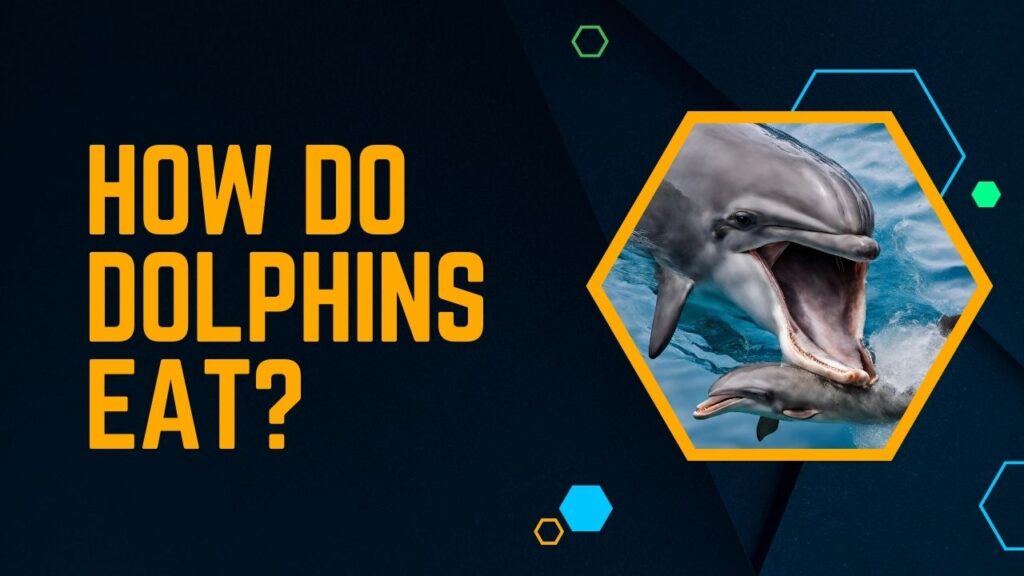
Dolphins are marine creatures renowned for their intelligence, agility and playful nature. One amazing aspect of their biology revolves around their eating habits.
It often piques people’s curiosity whether dolphins indulge in chewing like us humans and other land-dwelling animals.
In this blog post we will answer do dolphins chew their food shedding light on the reasons, behind their eating habits.
Table of Contents
Do Dolphins Chew Their Food?
Dolphins do not chew their food. They have teeth, but they use them to catch and bite their prey, not to chew it. Instead, they swallow their food whole.
There are a few reasons why dolphins don’t chew their food. First, they don’t have the same kind of jaw muscles as land mammals, which are needed for chewing.
Second, they need to eat quickly in order to avoid predators. Chewing would take too long and would make them vulnerable to attack.
Dolphins have a number of adaptations that allow them to eat without chewing. Their stomachs are very acidic, which helps to break down their food quickly.
They also have a special valve that prevents food from coming back up into their throats when they dive.
Dolphins eat a variety of prey, including fish, squid, octopus, and crustaceans. They typically hunt in groups, and they use a variety of techniques to catch their prey.
For example, some dolphins will herd their prey into a tight ball before attacking. Others will use their tails to stun their prey before eating it.
Dolphins are an important part of the marine ecosystem. They help to control populations of prey species, and they are also a food source for other predators, such as sharks and killer whales.
Why Do Dolphins Not Chew Their Food?
Dolphins do not chew their food primarily because of their evolutionary adaptations and their natural environment.
Here are a few reasons why dolphins don’t chew their food:
Adaptation to their diet: Dolphins primarily consume fish and squid, which are soft and easily digestible without the need for chewing. Their sharp teeth are more suited for grasping and catching prey rather than chewing through hard materials.
Efficiency in hunting: Dolphins are skilled hunters, and their streamlined bodies and sharp teeth enable them to catch fast and agile prey. Chewing food would slow down this process, making it difficult for them to catch their prey in the wild.
Conservation of energy: Chewing food requires energy, and dolphins, being highly active marine animals, need to conserve energy for swimming, diving, and other essential activities.
Swallowing food whole allows them to quickly process their meals and continue their activities without expending additional energy on chewing.
Digestive system: Dolphins have a well-developed digestive system that allows them to break down and digest their food efficiently in their stomachs.
Their stomachs have strong muscles and produce digestive enzymes that aid in the digestion process, making chewing unnecessary for their dietary needs.
In summary, the lack of a need to chew, combined with their hunting strategies, energy conservation, and efficient digestive system, has led to dolphins evolving to swallow their food whole rather than chewing it.
Do Dolphins Use Their Teeth To Chew?
No dolphins do not employ their teeth for chewing purposes. While they possess teeth, they primarily use them for seizing and biting prey than masticating it. Instead, dolphins have a tendency to engulf their food whole.
The dental structure of dolphins is specifically designed for capturing and grabbing prey than chewing it. They possess cone shaped teeth that are arranged in a row within each jaw. An ideal adaptation for acquiring a firm grip, on slippery fish.
Dolphins have a diet that includes fish, squid, octopus and crustaceans. They usually hunt in groups. Employ strategies to capture their prey. For instance, some dolphins gather their prey into a cluster before initiating an attack while others use their tails to stun the prey to consumption.
After catching its prey, the dolphin ingests it whole. The stomach acids of the dolphin then break down the food into nutrients that are absorbed into its bloodstream.
See Also: What Type Of Teeth Do Dolphins Have? Unveiling the Mystery
How Do Dolphins Eat?

Dolphins eat by catching and swallowing their prey whole. They do not chew their food. Dolphins have sharp, conical teeth that are arranged in a single row in each jaw. These teeth are perfect for grabbing and holding slippery fish.
Dolphins typically hunt in groups, and they use a variety of techniques to catch their prey. For example, some dolphins will herd their prey into a tight ball before attacking. Others will use their tails to stun their prey before eating it.
Once a dolphin has caught its prey, it will swallow it whole. The dolphin’s stomach acids will break down the food, and the nutrients will be absorbed into the dolphin’s bloodstream.
Dolphins eat a variety of prey, including fish, squid, octopus, and crustaceans. The specific types of prey that dolphins eat vary depending on their habitat and the time of year. For example, dolphins that live in tropical waters may eat different types of prey than dolphins that live in colder waters.
Dolphins search opportunity to eat food without prior planning. This helps them to survive in a variety of habitats and during different seasons.
See Also: Do Dolphins Eat Seagulls? The Surprising Truth
Do Dolphins Swallow Food Whole?
Yes, dolphins do swallow their food whole. Dolphins use their sharp teeth to catch and grasp their prey, but they do not chew their food into smaller pieces. Instead, they swallow the entire prey item, whether it’s a fish, squid, or another marine creature, whole.
Their throat is flexible enough to accommodate relatively large prey, allowing them to swallow it without the need for chewing.
Once the prey is swallowed, it travels down the dolphin’s esophagus into its stomach, where digestion begins. Dolphins have strong stomach muscles and digestive enzymes that help break down the food internally, allowing them to extract nutrients from the swallowed prey.
This method of consuming food is well-suited to their marine lifestyle, enabling them to efficiently feed on the move without spending time chewing their prey.
Why Do Dolphins Swallow Their Food Whole?
Dolphins have a way of eating as they swallow their food whole of chewing it. Their teeth are not redy for chewing. Rather, for grasping and swallowing their prey without causing any lacerations.
Interestingly dolphins have a stomach that accommodates the size of their prey. They possess a compartment in their stomach that helps break down the food as they don’t have the ability to chew it. This initial stage of digestion takes place in their fore stomach.
The majority of the digestion process occurs in the chamber of their stomach. It is in this section, known as the stomach, where food is further broken down before moving into the intestine.
The choice of fish and other creatures that dolphins consume depends on factors such, as location and time of year.
See Also: What Do Newborn Dolphins Eat? From Milk to Munchies
Frequently Asked Questions (FAQs)
Do Dolphins Ever Chew Their Food?
Dolphins do not chew their food in the way humans do. Their teeth are designed for grasping and tearing prey, not for grinding and chewing.
Can Dolphins Swallow Large Prey Whole?
Dolphins have the ability to tear larger prey into smaller pieces before swallowing, but they can also swallow smaller prey whole.
What Is Echolocation, And How Do Dolphins Use It In Hunting?
Echolocation is a biological sonar system that dolphins use to locate prey underwater. They emit sound waves, and by analyzing the echoes that bounce back, dolphins can determine the location, size, and shape of objects in their environment.
Conclusion
To summarize dolphins do not engage in chewing when it comes to consuming their food; instead, they rely on their teeth and remarkable hunting prowess to capture and swallow prey whole.
This exceptional feeding behavior stems from their adaptation to the marine environment and the necessity for hunting strategies.
Studying these captivating creatures not deepens our comprehension of life but also highlights the diverse ways in which various species have evolved to survive and thrive within their respective habitats.

Mr. Das, a certified pharmaceutical scientist, holds a Bachelor of Science in Pharmaceutical Sciences and passionately contributes to dolphin conservation as a member of the committee in Bangladesh.


